- Home
- Ann Patchett
The Dutch House Page 10
The Dutch House Read online
Page 10
“Terrific.” I took out two bottles of beer, found the opener, and handed one to her.
She took a swig, then cleared her throat to begin. “So, to the best of my understanding, what we own in the world is pretty much what you see around you.”
“Which is nothing.”
“Exactly.”
I hadn’t considered the possibility of nothing before and a flush of adrenaline shot through me, preparing me for fight or flight. “How?”
“Lawyer Gooch, and he was lovely, by the way, could not have been nicer, Lawyer Gooch said the general rule of thumb is shirtsleeves to shirtsleeves in three generations, but we made it in two, or I guess technically we made it in one.”
“Which means what?”
“It means that traditionally the first generation makes the money, the second generation spends the money, and the third generation has to go to work again. But in our case, our father made a fortune and then he blew it. He completed the entire cycle in his own lifetime. He was poor, then rich, and now we’re poor.”
“Dad didn’t have money?”
She shook her head, glad to explain. “He had tons of money, just not tons of acumen. His young wife told him she believed that marriage was a partnership. Remember those words, Danny: Marriage is a partnership. She had him put her name on everything.”
“He put her name on all the buildings?” That didn’t seem possible. There were a lot of buildings, and he bought them and sold them all the time.
She shook her head and took another drink. “That would be for amateurs. Conroy Real Estate and Construction is a corporation, which means that everything in the company is gathered together under one roof. When he sold a building, the cash stayed in the corporation, and then he used it to buy another building. Andrea had him put her name on the company, which means she has joint ownership with right of survivorship.”
“That’s legal?”
“All assets are passed by operation of the law to his wife because of joint titling. Are you following this? I know it took me a minute.”
“I’m following.” I wasn’t sure that was true.
“Smart boy. The same goes for the house. The house and all its contents.”
“And Lawyer Gooch did this?” I knew Lawyer Gooch. He came to my basketball games sometimes and sat in the bleachers with our father. Two of his sons had gone to Bishop McDevitt.
“Oh, no.” She shook her head. She liked Lawyer Gooch. “Andrea came with her own lawyer. Someone in Philadelphia. Big firm. Lawyer Gooch said he talked to Dad about it many times, and you know what Dad said? He said, ‘Andrea’s a good mother. She’ll look after the children.’ Like, he married her because he thought she was good with children.”
“What about the will?” Maybe Maeve was right about the second generation because even I knew enough to ask about a will.
She shook her head. “No will.”
I sat down in a kitchen chair and took a long drink. I looked up at my sister. “Why aren’t we screaming?”
“We’re still in shock.”
“There has to be a way out of this.”
Maeve nodded. “I think so, too. I know I’m going to try. But Lawyer Gooch told me not to get my hopes up. Dad knew what he was doing. He was competent. She didn’t make him sign the papers.”
“Of course she made him!”
“I mean she didn’t hold a gun to his head. Think about it: Mommy leaves him, then this slinky chinchilla comes along and tells him she’s never going to leave him. She wants to be part of everything he does, what’s mine is yours. She’ll look after all of it and he’ll never have to worry.”
“Well, that much is true. He doesn’t have to worry.”
“The wife of four years gets it all. She even owns my car. Lawyer Gooch told me that. She owns my car but she told him I could keep it. I’m definitely going to sell it before she changes her mind. I think I’m going to get a Volkswagen. What do you think?”
“Why not?”
Maeve nodded. “You’re smart,” she said, “and I’m pretty smart, and I used to think Dad was smart, but the three of us together couldn’t hold a candle to Andrea Smith Conroy. Lawyer Gooch wants you and me to come in together. He said there are still a few things left to go over. He said he’d keep working on our behalf, free of charge.”
“It would have been better if he’d worked on our behalf while Dad was still alive.”
“Apparently he tried. He said Dad didn’t think he was old enough for a will.” Maeve thought about this for a minute. “I bet Andrea has a will.”
I drained my beer while Maeve leaned against the stove and smoked. We were delinquents in our own small way. “Two dead husbands,” I said, though Andrea must have been, what then? Thirty-four? Thirty-five? Ancient by the standards of a teenaged boy. “Did you ever wonder what happened to Mr. Smith?” I asked.
“Never once.”
I shook my head. “Me neither. That’s strange, isn’t it? That we never thought about Mr. Smith, how he died?”
“What makes you think he’s dead? I always thought he put her out on the curb with the kids, and Dad must have driven by at just the wrong moment, offered them a ride.”
“I feel bad for Norma and Bright over there by themselves.”
“May they rot in hell.” Maeve stubbed her cigarette out on a saucer. “All three of them.”
“You don’t mean that,” I said. “Not the girls.”
My sister reared back with such ferocity that for a split second I thought she meant to hit me. “She stole from us. Do you not understand that? They’re sleeping in our beds and eating off our plates and we will never, never get any of it back.”
I nodded. What I wanted to say, what I did not say, was that I’d been thinking the same thing about our father. We would never get him back.
Maeve and I set up housekeeping together. We found a secondhand dresser at the Goodwill and stuck it in the corner of the bedroom so I could put my clothes away. I still didn’t like taking the bedroom, but every night, Maeve went to the couch with her stack of blankets. I wanted to ask her about finding a bigger place, but seeing as how it was all on her—our food and our shelter—I thought better of it.
When everything was all set up, we called Sandy and Jocelyn to come and see what we’d accomplished. Maeve brought home a white box of cookies from the bakery. She arranged the cookies on a plate and threw out the box, as if we were going to fool them. I straightened up the cushions on the couch, she put away the glasses that were in the drainboard. When the bell finally rang we threw open the door and the four of us exploded with joy. What a reunion! You would have thought it had been years since we’d seen one another.
It had been two weeks.
“Look at you,” Sandy said, reaching up to put her hands on my shoulders. I thought her hair was grayer. There were tears in her eyes.
Sandy and Jocelyn hugged us and kissed us in a way they never had at home. Jocelyn was wearing dungarees and Sandy had on a cotton skirt with cheap tennis shoes. They were regular people now, not the people who worked for us. Still, they handed over one big jar of minestrone soup (Maeve’s favorite) and another of beef stew (mine).
“You can’t feed us!” Maeve said.
“I’ve always fed you,” Jocelyn said.
Sandy took a skeptical glance around the living room. “I could come by every now and then, help you keep things up.”
Maeve laughed. “How could I not keep this clean?”
“You have a job,” Sandy said, looking down and running the toe of her shoe across the floor. “You don’t need to worry about keeping house on top of everything else. Anyway, how long could the whole thing take me, an hour?”
“I can do it,” I said, and the three of them looked at me like I was suggesting I make my own clothes. “Maeve won’t let me get a job.”
“Stick to basketball,” Sandy said.
“And making decent grades,” Jocelyn said.
Maeve nodded. “Let’s just wait for a little bi
t, see how we do.”
“We’re doing fine, really,” I said.
Sandy disappeared into the bedroom and came back five seconds later, looking at me. “Where do you sleep?”
“Does he know how to take care of you?” Jocelyn asked my sister.
Maeve waved her hand. “I’m fine.”
“Maeve,” Jocelyn said. It’s a funny thing to say but she was being stern. Sandy and Jocelyn were never stern with Maeve.
“I take care of everything.”
Jocelyn turned to me. “I have found your sister passed out cold on more than one occasion. Sometimes she forgets to eat or she doesn’t take enough of her insulin. Sometimes it’s nothing she’s done wrong but her sugar goes off all the same. You’ve got to keep an eye on her, especially when things are stressful. She’ll tell you stress has nothing to do with it, but it does.”
“Stop,” Maeve said.
“She has sugar tablets. You make her show you where she keeps them, make sure she has extras in her purse. If she’s in trouble you have to give her a sugar tablet and call an ambulance.”
I tried to take in the thought of Maeve on the floor. “I know that,” I said, keeping my voice steady. I knew about the insulin but not the sugar. “She showed me.”
Maeve sat back, smiling. “Straight from the horse’s mouth.”
Jocelyn looked at us for a minute, then shook her head. “You’re appalling, both of you, but it doesn’t matter. Now that he knows about it he’ll make you show him. You’ll bug her once we leave, won’t you Danny?”
Even though I was sensitive to the fluctuation of Maeve’s blood sugar, I realized I didn’t know the details. I knew how to stand by and watch her take care of herself, but that was not the same thing as taking care of her. Jocelyn was right though, I would make Maeve explain everything to me once they were gone. “I will.”
“You know I’ve been living in this apartment by myself all this time, don’t you?” Maeve said. “It’s not like Danny’s been riding his bike over here at night to give me injections.”
“Or you can call me,” Jocelyn said, ignoring her completely. “I’ll tell you everything you need to know.”
Sandy had found a job keeping house in Elkins Park. “They’re nice enough. Not as much money,” she said, “and not as much work.” Jocelyn had found a family to cook for in Jenkintown but she also had to help with the two children and was expected to walk the dog. Not as much money and considerably more work. The sisters laughed. Better to have been fired, was what they said. That made it a badge of honor. They wouldn’t have stayed in that house a minute without me anyway.
“Once I get settled I’m going to try to talk my family into hiring Jocelyn. They need a cook. That way we could be together again,” Sandy said.
Had I handled the situation better and not been critical—not just at the end but for all the years Andrea had been in our lives—Sandy and Jocelyn would still be sitting together at the blue kitchen table, shelling peas and listening to the radio.
Sandy was looking up at the ceiling, the windows, like she was measuring the place in her head. “Why didn’t you move into one of your father’s buildings?” she asked my sister.
“Oh, I don’t know,” Maeve said. She was still flustered about the insulin.
Jocelyn took the spot beside Sandy on the couch. Maeve had the chair and I sat on the floor. “I didn’t think about it when you got this place but it doesn’t make any sense,” Sandy said. “You must have really had to work to find an apartment building in this town your father didn’t own.”
I’d wondered about it myself. The only reason I could come up with was that she had asked him for an apartment and he’d said no.
Maeve looked at us, the three of us, all the family she had. “I thought I would impress him.”
“With this place?” Sandy leaned over and straightened a stack of my school books on the coffee table in front of her.
Maeve smiled again. “I made out a budget and this was what I could afford. I thought he’d notice that I hadn’t asked him for anything, that I’d saved up my spending money from my last year of school. I had first and last month’s rent. I got the job. I bought the bed and then the next month I bought the couch and then I bought the chair at Goodwill. You know him, the way he liked to go on about the wonders of poverty, how making it all by yourself was the only way to learn anything. I thought I was showing him I wasn’t like the rich girls I knew from school. I wasn’t waiting around for him to buy me a horse.”
Sandy laughed. “I never thought anyone was going to buy me a horse.”
“Well, that’s just fine.” Jocelyn smiled. “I know he was proud of you, the way you did all this yourself.”
“He didn’t notice,” Maeve said.
Sandy shook her head. “Of course he did.”
But Maeve was right. He’d never seen what she had meant to show him. He had no notion of her self-reliance. The only thing my father ever saw in my sister was her posture.
Maeve made coffee and she and Jocelyn smoked while Sandy and I watched them. We ate the cookies and dredged up every awful memory of Andrea we had. We traded them between us like baseball cards, exclaiming over every piece of information one of us didn’t already know. We talked about how late she slept and every unflattering dress she’d worn and how she would spend an hour on the phone with her mother but would never invite her mother to the house. She wasted food and left the lights on all night and gave no evidence of having ever read a book. She’d sit by the pool for hours just staring at her fingernails and then expect Jocelyn to bring her lunch on a tray. She didn’t listen to our father. She gave away Maeve’s bedroom. She threw me out. We dug a pit and roasted her.
“Can anyone explain to me why he married her in the first place?” Maeve asked.
“Sure.” Jocelyn didn’t need to give it a thought. “Andrea loved the house. Your father thought that house was the most beautiful thing in the world and he found himself a woman who agreed.”
Maeve threw her hands up. “Everyone agreed! It’s not like it would have been so hard to find a decent woman who liked the house.”
Jocelyn shrugged. “Well, your mother hated it and Andrea loved it. He thought he’d solved the problem. But I got to her, didn’t I? Saying all that about your mother.”
Sandy covered her face with her hands and laughed. “I thought she was going to drop dead right on the spot.”
I looked at Sandy and then Jocelyn. Now they were both laughing. “You didn’t mean it?”
“What?” Sandy said, wiping at her eyes.
“About our mother being, I don’t know, like a saint?”
The tension in the room shifted and then we were all very aware of how we were sitting and what we were doing with our hands. “Your mother,” Jocelyn said, and then she stopped and looked at her sister.
“Of course we loved your mother,” Sandy said.
“We all loved her,” Maeve said.
“She was gone a lot,” Jocelyn said, trying to pick her words.
“She was working.” Maeve was tense but in a different way from Sandy and Jocelyn.
I had no idea what any of them were talking about, nor did I know that our mother had ever had a job. “What did she do?”
Jocelyn shook her head. “What didn’t she do?”
“She worked for the poor,” Maeve said to me.
“In Elkins Park?” There were no poor people in Elkins Park, or none that I’d ever seen.
“She worked for the poor everywhere,” Sandy said, though I could tell she was trying her best to explain the situation kindly. “She could always find people who needed something.”
“She went out looking for poor people?” I asked.
“Dawn to dusk,” Jocelyn said.
Maeve stubbed out her cigarette. “Okay, stop this. You make it sound like she was never there.”
Jocelyn shrugged and Sandy reached down for the thumb-print cookie with the round spot of apricot jam.
“Well,” Maeve said, “we were always happy when she came home.”
Sandy smiled and nodded. “Always,” she said.
Early Sunday morning Maeve came into the bedroom and opened the blinds. “Get up, get dressed. We’re going to church.”
I pulled a pillow over my head, hoping to find my way back into the dream I was falling out of, a dream I already couldn’t remember. “No.”
Maeve leaned over and pulled off the pillow. “I mean it. Up, up.”
I looked at her from one slitted eye. She was wearing a skirt, and her hair, still wet from the shower, was braided. “I’m sleeping.”
“I’ve been very nice. I let you sleep through the eight o’clock service. We’re going to make the ten-thirty.”
I dug my face into the pillow. I was waking up and I did not want to wake up. “There’s no one watching. No one can make us go to church anymore.”
“I can make us go.”
I shook my head. “Make yourself go. I’m going back to sleep.”
She dropped down hard on the edge of the bed, making me bounce a little. “We go to church. That’s what we do.”
I turned over on my back and opened my eyes grudgingly. “You’re not following.”
“Up, up.”
“I don’t want anyone hugging me or telling me how sorry they are. I want to go back to sleep.”
“They’ll hug you this Sunday and next Sunday they’ll just wave like nothing ever happened.”
“I’m not going next Sunday either.”
“Why are you being like this? You never complained about going to church before.”
“Who would I have complained to? Dad?” I looked at her. “You win all the fights. You know that, right? When you have kids of your own you can make them go to church every morning and say the rosary before school. But I don’t have to go, you don’t have to go. We don’t have parents. We can go out for pancakes.”
She shrugged. “Get your own pancakes,” she said. “I’m going.”
“You don’t need to do this for me.” I raised up on my elbows. I couldn’t believe she was carrying her point so far. “I don’t need a good example.”
“I’m not doing this for you. Jesus, Danny. I like going to Mass, I like believing in God. Community, kindness, I buy into the whole thing. What in the hell have you been doing in church all these years?”

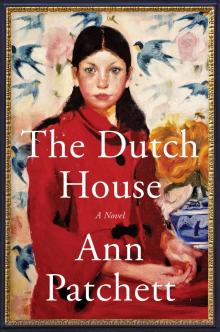 The Dutch House
The Dutch House Bel Canto
Bel Canto This Is the Story of a Happy Marriage
This Is the Story of a Happy Marriage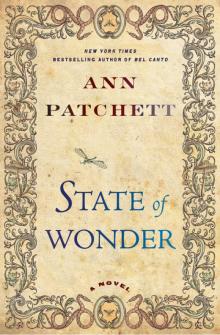 State of Wonder
State of Wonder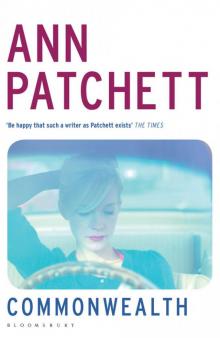 Commonwealth
Commonwealth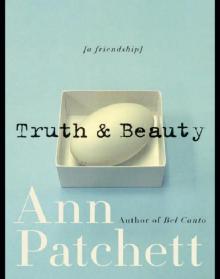 Truth & Beauty: A Friendship
Truth & Beauty: A Friendship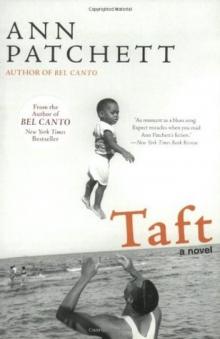 Taft
Taft What Now?
What Now?